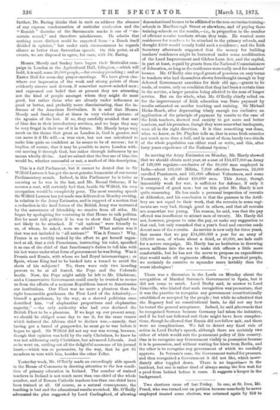In moving the Army Estimates on -Monday, Mr. Hardy showed
that we should obtain next.year, at a cost of 114,677,000 an Army of 129,000 regulars—exclusive of the 60,000 men employed in India—about 103,000 Militia, 7,928 effective Reserves, 22,000 enrolled Pensioners, and 161,000 efficient Volunteers, and some Yeomanry, in all about 450,000 men. This Army, though lamentably weak for war, is sufficient for defence, if only it is composed of good men ; but on this point Mr. Hardy is not quite reassuring. He has made a personal inspection of recruits at Aldershot, and his conclusion is that the gunners in the Artil- lery are not equal to their work, that the recruits in some regi- ments are very bad, though good in others, and that all recruits are somewhat too young. The reason, he said, was that the pay offered was insufficient to attract men of twenty. Mr. Hardy did not, however, propose to raise the pay, or make any suggestion to that end, but only remarked that a year's food and exercise male decent men of the recruits. As service is now only for three years, that means that we pay 114,000,000 a year for an army of 129,000 men, of whom about a third, or 40,000, are lads unfit for a severe campaign. Mr. Hardy has no hesitation in throwing seven millions into the sea to make rich -officers a little more comfortable, but he has not the nerve to propose an expenditure that would make all regiments efficient. For a practical people, we certainly do contrive to squander more lavishly than the worst ideologues !


































 Previous page
Previous page